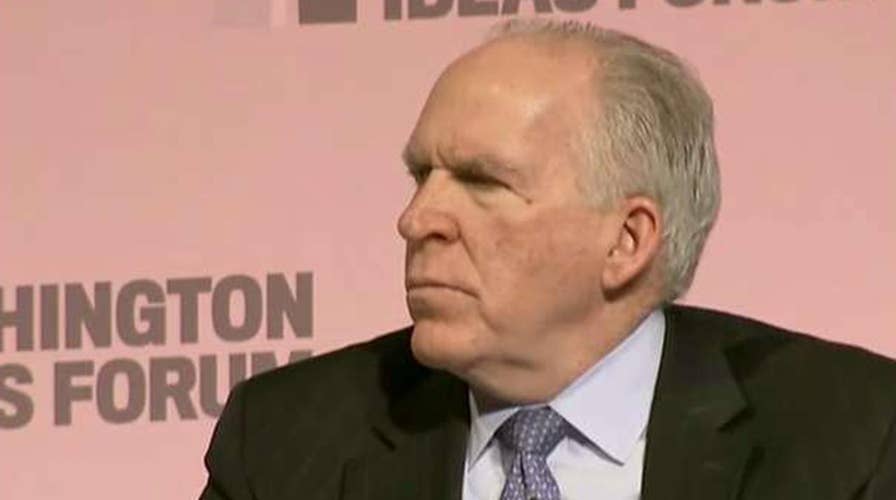President Trump revokes John Brennan's security clearance
White House press secretary Sarah Sanders reads a statement from President Trump, which cites former CIA Director John Brennan's 'erratic conduct and behavior.'
President Trump’s revocation of former CIA Director John Brennan’s security clearance has set off a debate among lawyers: does Brennan have the right to appeal the decision?
Trump said he has a “unique, constitutional responsibility to protect the nation’s classified information,” in announcing that he yanked the clearance of Brennan, who led the CIA for nearly four years under the Obama administration and has not shied away from criticizing the current president.
But Brennan derided the move as the president working “to suppress freedom of speech [and] punish critics.”
“It should gravely worry all Americans, including intelligence professionals, about the cost of speaking out,” he said in a tweet. “My principles are worth far more than clearances. I will not relent.”
OBAMA OFFICIALS WHO COULD LOSE SECURITY CLEARANCES UNDER TRUMP: A LIST
Brennan has said he is considering legal action in order to prevent Trump from pulling the security clearances of other people, something he said would be “a small price to pay.”
It’s not uncommon for former officials to maintain their security clearances after leaving the job. In some cases, former federal employees, including in the CIA and FBI, can be called back to consult or offer advice on an issue.
But there’s a difference between maintaining a security clearance and actually having access to classified material, Bradley Moss, a lawyer specializing in security clearances, told Fox News.
Individuals who have one of three levels of security clearances – top secret, secret or confidential – don’t necessarily get access to any classified information that’s out there; normally, one will just be able to access what the agency has deemed appropriate for what that person needs to know.
And it’s much the same with former officials, Moss said. They’re “only allowed to see things the existing agency officials decide they want to consult with them on matters.”
WHAT ARE SECURITY CLEARANCES AND WHY DO SOME FORMER OFFICIALS STILL HAVE THEM?
He said the move to yank Brennan’s security clearance is an “additional unnecessary step.”
"It would set up a serious clash of constitutional questions..."
But the move has also sparked questions about whether Brennan can appeal the decision.
An individual does have the ability to appeal – both in person and in writing – when a security clearance is denied or revoked by the respective agency, according to an executive order. However, an agency head can determine that an appeal process cannot take place “without damaging the national security interests of the United States by revealing classified information,” the executive order states.
But the revocation of Brennan’s security clearance came from Trump – not a current agency head – which Moss argues there is no precedent for.
Prior to Trump’s decision, Moss said “it is anyone’s guess how the courts would construe the issue.”
TRUMP’S FULL STATEMENT ON REVOKING JOHN BRENNAN’S SECURITY CLEARANCE
“It would set up a serious clash of constitutional questions between the inherent authority of the president regarding classified information, the procedural due-process rights of clearance holders under the Fifth Amendment, and the extent to which the judiciary is even permitted to rule on the matter,” Moss said.
John Berry, an attorney who specializes in security clearances, said he is interested in who would hear the case if an appeal was allowed.
“Would it be the president himself or someone he would designate to hear it?” Berry asked Fox News.
However, Sean Bigley, a national security attorney, argued one’s First Amendment rights do not transcend into a right to have a security clearance.
“The president is ‘the government’ when it comes to making security clearance determinations, as the granting, denial, or revocation of a security clearance falls squarely within the president’s commander-in-chief powers per [a Supreme Court ruling],” Bigley said in an online statement.
Mark Zaid, a national security attorney, also seemed to squash the idea Brennan could sue in an interview with Vox.
“They can’t sue. I mean, anybody can sue, you can sue for anything, but they have no basis,” Zaid said. “There’s a Supreme Court precedent from 30 years ago that restricts federal judges from handling security clearance appeals.”
“This really is the power of the executive branch. And it’s an unchecked power at this stage,” he added.
Trump has said he “hopes” Brennan does sue so it “will then be very easy to get all of his records, texts, emails and documents to show not only the poor job he did, but how he was involved with” the Russia investigation, which the president has often called a “rigged witch hunt.”
























